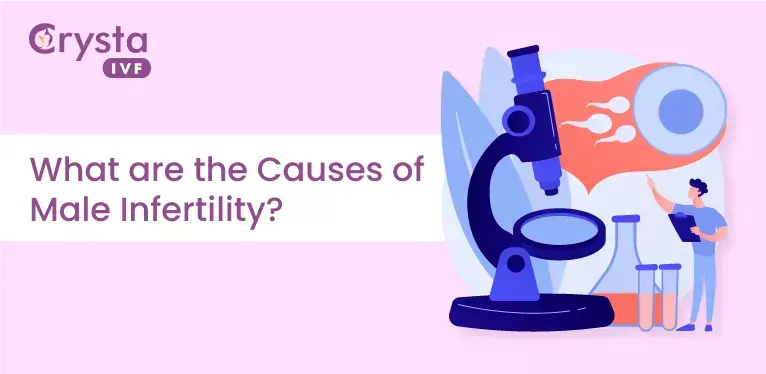Are you aware of the term “male infertility”? Or do you think it is a common issue to talk about? Whatever questions you have in your mind, in reality, male infertility is still a taboo that most men wouldn’t consider speaking about.
Research says that men are equally responsible for the infertility rate globally. Around 30% of infertility problems in couples start with the males, 30% with the females, and the rest result from both.
To overcome the fertility challenge, it is important to shed light on the causes of male infertility and how they can be prevented from becoming major issues, especially when you are looking forward to planning a baby. So, let’s raise awareness together and understand what male infertility is and its causes.
Male Infertility: What does science say?
Male infertility refers to the inability of a man to impregnate a fertile female partner after a yearc or more of regular, unprotected sexual intercourse. To understand it more deeply, let’s examine its symptoms.
Signs and Symptoms of Male Infertility
- Low sperm count or any other sperm abnormality
- Male with a family history of prostate problems and infertility
- Swelling in the scrotum
- Small testicles
- Altered sexual desire (low libido) and functions
Did you recognise these signs? If you do, then you need to pay attention and do not need to panic. Male infertility can only be treated well when its causes are identified. So, come one step closer and recognise the most observable causes of male infertility.
Causes of male infertility
In the discussion below, we will explore the factors contributing to male infertility. While there are instances where specialists cannot pinpoint a specific cause for male impotence, it is important to note that in the majority of cases, infertility is attributable to natural, hereditary, or identifiable factors.
There are many significant explanations behind male infertility, even though it commonly doesn’t show apparent manifestations. Frequently, male infertility is just recognized after a couple’s diligent, ineffective trials at conception.
Male fertility is described as a complex process. To make sure the pregnancy occurs as a male you must have:
- Production of healthy sperm: this entirely depends on the natural formation of male reproductive organs during puberty. For this, the male testicle must function properly, and the hormonal synthesis should be normal to produce healthy sperm.
- Sperm movement: If the sperm is abnormally motile or functioning, it will be unable to penetrate or reach towards the female egg. Thus, this is also a main cause of male infertility.
Clinical causes
Issues associated with male infertility can also be a result of medical problems and clinical treatments:
Varicocele: The most common and treatable cause of male infertility is “varicocele” (enlargement of veins inside the scrotum) which depletes and voids the testicles due to abnormal blood flow. It is also one of the causes of low sperm counts and inferior quality.
Infections: Some infections can also block the passage, damage the sperm’s health, or hinder the process of sperm production, such as inflammation in the testicles and epididymis, including sexually transmitted diseases. Some STDs, such as chlamydia and gonorrhoea, can cause genital inflammation, sperm ejaculation obstruction, and other symptoms that may be the main causes of low sperm counts if left untreated.
Antibodies: Sometimes anti-sperm antibodies mistakenly attack the sperm and start destroying them just by identifying them as a foreign body.
Birth defection: during the foetus’s developmental stage inside the mother’s womb, testicles fail to fit into the sac called the scrotum. This abnormal condition (undescended testicles) may also cause infertility in males.
Abnormal glands: Insufficient hormone production may also occur due to abnormalities in the pituitary, adrenal, and hypothalamus glands, which may lead to male infertility.
Tubal Defect: the sperm-carrying tubes may get blocked due to certain causes, such as prior infection, reproductive organ-related surgery, or any genetic abnormality. And this blockage can be in the urethra or in the ejaculatory ducts, which may directly affect the sperm quantity.
Chromosomal Defect: some genetic disorders, including Klinefelter’s syndrome, are also the cause of male infertility in some people. In this inherited disorder, a male has two X chromosomes and one Y (abnormal chromosomes: XXY) instead of the normal pair of chromosomes (XY), which causes abnormalities in the male reproductive organs and eventually male infertility.
Disease: Diabetes, or high blood glucose levels, as we know, increases the risk of infections, damages nerves and blood vessels, and causes some sexual problems such as low libido, balanitis, erectile dysfunction, and abnormal sperm ejaculation, which are the main signs of infertility in men. All these things contribute to male infertility.
- Men with diabetic conditions may suffer from azoospermia and low testosterone levels (a male hormone) more often compared to non-diabetic men.
- A digestive disorder known as “celiac disease” may also contribute to male infertility if left undiagnosed. However, it is a temporary cause and can be improved by adopting a gluten-free diet.
Medications: Cancer medications or chemotherapy, steroids, and arthritis medications can also impair sperm production and function, thus diminishing male fertility and giving rise to various signs of infertility in men.
Surgery: Some surgeries may cause sperm ejaculation problems, mainly vasectomy, prostatectomy, scrotal, abdominal, and prostrate surgeries done for rectal or testicular cancers or other illnesses related to the reproductive system. These are the main causes of impotence.
Cancer or malignant tumours: Another reason is that cancer or tumours may require chemotherapy, radiation, or surgery to be treated. It can affect the hormone-releasing pituitary gland and harm the reproductive system.
Poor lifestyle choices: Male infertility can also be the result of poor lifestyle choices. When you decide to follow the abolished trend and consume too much alcohol, tobacco, and caffeine while not following any physical activity, you hit rock bottom and affect your fertility health severely.
Male infertility is still a complex issue that no one wants to talk about due to shyness and in some cases due to an inferiority complex. But you should know that if you will not speak up today, there will be no tomorrow. So be brave enough, speak up and consult the best fertility expert in the town to determine how you can overcome the biggest hurdle of your life on the path of your parenthood journey.
Consult a fertility expert: Fight your fertility issue now!
The more you speak about it, the more you know how complicated your reproductive health is, and one wrong step towards it can put all your dreams of being a happy parent to a child in vain. So, before it gets too late, take your fertility health seriously and consult with the top-notch fertility expert at the best IVF centre in Delhi, Crysta IVF.
Here, all your fertility challenges will be resolved as they will be looked over by a team of IVF specialists. Moreover, you do not have to shy away from your issues; a personalized approach will be tailored to your comfort.
Crysta IVF makes sure to be together with their patients through thick and thin, whether you are taking your first step at the fertility hospital or bidding goodbye with a healthy child in your hand. We affirm to walk together in every step you take on the path of a successful pregnancy. So, don’t lose hope because your dream of being a happy parent to a healthy child is about to become a reality.




